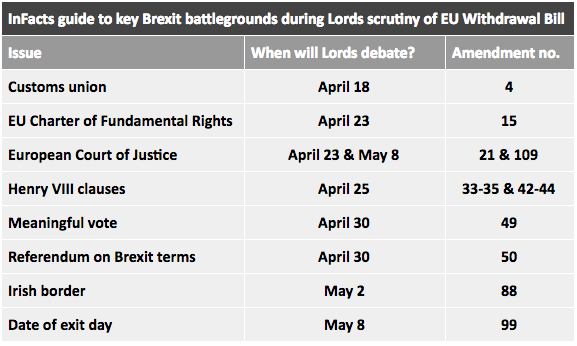David Hannay is a member of the House of Lords and former UK ambassador to the EU and UN.
At the end of March the House of Lords completed the Committee Stage of its consideration of the government’s EU Withdrawal Bill. That was eleven days of painstaking scrutiny of what has turned out to be an even more flawed bill than was thought at the outset. This is what the Lords does best, though the same cannot be said of ministers’ defence of the bill which ranged between the perfunctory and the ill-informed.
There have been no votes so far, as is normal practice at Committee Stage in the Lords, but plenty to come at Report Stage which takes place over six days beginning this week and concluding on May 8. You can be sure the Commons will be asked to think again on some aspects of this bill. But none of the amendments will either wreck the bill or stop it in its tracks – they are all designed to improve it.
Here is a (non-exhaustive) list of some of the main amendments with cross-party support from the Labour, Liberal Democrat, Conservative and independent benches.

1. Customs Union
This amendment would require the government to include a customs union in the range of possible outcomes to be negotiated with the other 27 EU countries. It’s an important contribution to avoiding a hard border in Northern Ireland. A separate amendment on the single market is less likely to pass.
2. EU Charter of Fundamental Rights
This amendment remedies the omission of the Charter from the massive list of EU legislation to be incorporated into UK domestic law.
3. European Court of Justice
Amendment 109 would remove the provision that ECJ jurisdiction ends on exit day (already conceded by the government in the deal it has struck in Brussels on a transitional period); and amendment 21 would give our courts the right to use ECJ jurisprudence in reaching their decisions.
4. Henry VIII clauses
A series of amendments are designed to constrain the government’s use of powers to bypass proper parliamentary scrutiny when changing EU laws, setting up public bodies or giving these bodies powers to levy fees or create criminal offences.
5. Meaningful process
This clarifies and strengthens Dominic Grieve’s amendment already in the bill by ensuring that any outcome to the Brexit negotiations – including a no deal outcome – is submitted to Parliament for decision before it can be formally concluded in Brussels.
6. A referendum on the terms of the outcome
This provision would offer the possibility, but not the necessity, of holding a referendum on the terms of the Brexit negotiations. It’s less likely to pass than some of the others since it will not have front bench Labour support.
7. Northern Ireland
This the amendment seeks to put on the face of the bill the avoidance of a hard border between Ireland and Northern Ireland.
8. Exit Day
Removing the reference to March 29 2019 as exit day would thus avoid cutting off the option to extend the Article 50 negotiating period if necessary.
Many other important issues remain at stake, including the handling of policies which fall within the powers delegated to Edinburgh, Cardiff and Belfast after decision-making is repatriated from Brussels. The government has brought forward amendments of its own (mainly amendment 26) because of the lack of support at Committee Stage for the present text of the bill concerning retained EU law. But we wait to see whether they have done enough to satisfy their parliamentary critics on this point.
Like watching paint dry, you may think. Indeed so. But there are important issues at stake, even if this is not the moment or the vehicle for determining the existential matter of Brexit or no Brexit.
Research by Nick Kent.
This article has been updated. The original article was published on March 28 2018.
Edited by Luke Lythgoe

If there is another referendum, the questions should be:
Do we accept the negotiated deal? or
Do we reverse our decision to leave the EU?
Much as I welcome the inclusion of Customs Union membership in the Lords amendment, I’m missing an amendment which would keep us inside the Single Market. That is the one which would have a far greater impact on people continuing to be able to move around and to have dealings with the rest of Europe. The prospect of having to apply for a visa in advance to move around Europe is a nightmare scenario. Continued free Single Market access would also, of course, be welcomed by the vast majority of businesses.